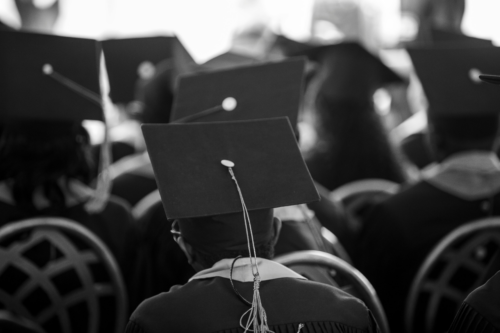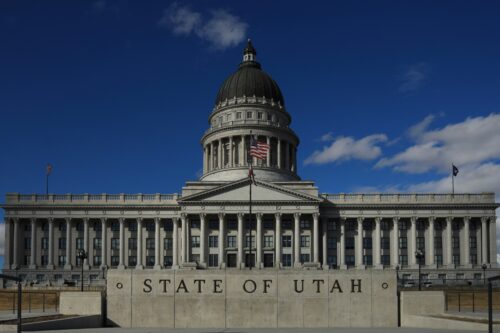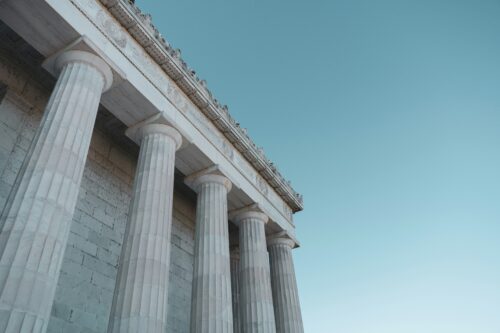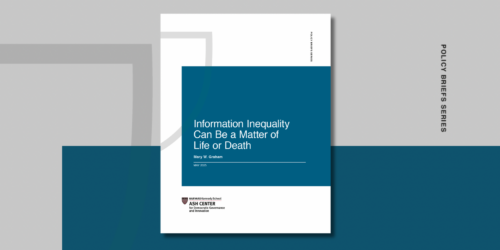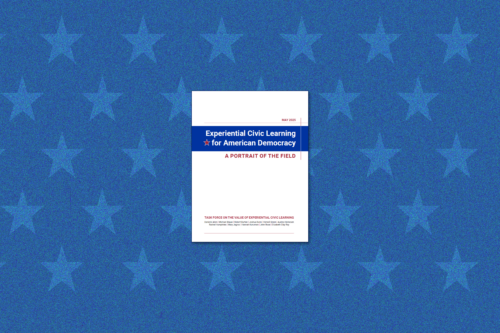
Additional Resource
Experiential Civic Learning for American Democracy
A new report provides a clear, actionable framework for effective experiential civic learning—what it is, why it matters, and how to do it well.
Feature
In new paper, Danielle Allen explores how higher ed can play a role in promoting the health of our democracy.
“Civic education and engagement in our universities — educating toward self-government and engaged citizenship — could use a major reset,” notes Danielle Allen along with John Bridgeland and Cecilia Muñoz in a recently published article. Bridgeland and Muñoz, served as senior White House domestic policy advisors in the George W. Bush and Obama administrations, respectively.
Across the nation, surveys show that trust in one another and key institutions, such as government, media, and the courts, has reached historic lows. At the same time, political polarization among Americans has escalated rapidly over the past 40 years, while participation in large-scale civic institutions and volunteering rates have declined. Higher education offers a path forward – it can prepare young people to participate in democratic processes and, ultimately, change the country’s direction.
Colleges and universities have a critical role to play in enabling students to have vigorous and contentious debates about a whole range of issues while engaging in civil discourse that respects students who may hold different views![Headshot of Danielle Allen]()
Danielle Allen
James Bryant Conant University Professor
While higher education cannot address every civic challenge, it plays a pivotal role in fostering civic education and engagement. “Civic learning in college can and should help democracy rebuild and renew our capacity to work together to form a “more perfect union,” a durable goal for our constitutional republic,” Allen, Bridgeland and Muñoz write in their article published in Change: The Magazine of Higher Learning.
With a majority of high school graduates transitioning directly to college, and millions more eventually enrolling, there is a pressing need to enhance civic participation and democratic learning in higher education, the authors argue. Several key strategies emerge, starting with implementing mandatory civic curricula with a focus on building foundational civic knowledge and the skills and dispositions needed to support constitutional democracy. Colleges and universities can also incentivize civic engagement through civic seals on diplomas in recognition of community service, experiential learning, and other civic contributions. Further, schools can advocate for policies that support a year of national service.
Institutions should encourage an environment of robust civil discourse. “Colleges and universities have a critical role to play in enabling students to have vigorous and contentious debates about a whole range of issues while engaging in civil discourse that respects students who may hold different views,” Allen and her co-authors urge.
Just as the world rallied behind sustainable development goals, the paper makes the case that colleges and universities can advance the goals of More Perfect, a national initiative to advance five democracy goals: universal civic learning, national service and volunteering, bridging divides, trusted elections and representative and responsible governance, and access to trusted news and information.
Ultimately, “the best ideas are likely to emerge from colleges and universities themselves in all of their wonderful diversity—public, private, independent, community, technical, historically black, Hispanic-serving, and tribal colleges and universities, and within the many associations and networks that represent them.” The authors propose holding an annual summit among college leaders to highlight innovations in higher education that foster democratic renewal and to facilitate knowledge-sharing and promote scalability at other institutions. “As our colleges and universities continue to play such central roles in educating and engaging generations of Americans, we can inspire students to understand our democracy and their vital role in it.”
Additional Resource
A new report provides a clear, actionable framework for effective experiential civic learning—what it is, why it matters, and how to do it well.
Additional Resource
The bipartisan Utah Digital Choice Act aims to reform the social media ecosystem by giving users more choice and ownership over their personal data, while encouraging platform innovation and competition.
Policy Brief
The GETTING-Plurality Research Network submitted a public comment on the Development of a 2025 National Artificial Intelligence Research and Development Strategic Plan.
Feature
A collection of must-reads curated by Ash Center’s Reimagining Democracy team.
Feature
The official start of Summer is almost here, and Stephen Richer, Senior Practice Fellow in American Democracy and former elected Maricopa County Recorder, shares his summer reading list with a range of books focused on his work of democracy and elections, as well as his personal favorites.
Policy Brief
In this paper, Mary W. Graham, co-director of the Center’s Transparency Policy Project, examines how unintended information inequities undermine critical health and safety alerts. Focusing on three key policies — wildfire alerts, drinking water reports, and auto safety recalls — she identifies common roots of these disparities and highlights efforts by policymakers to address them.
